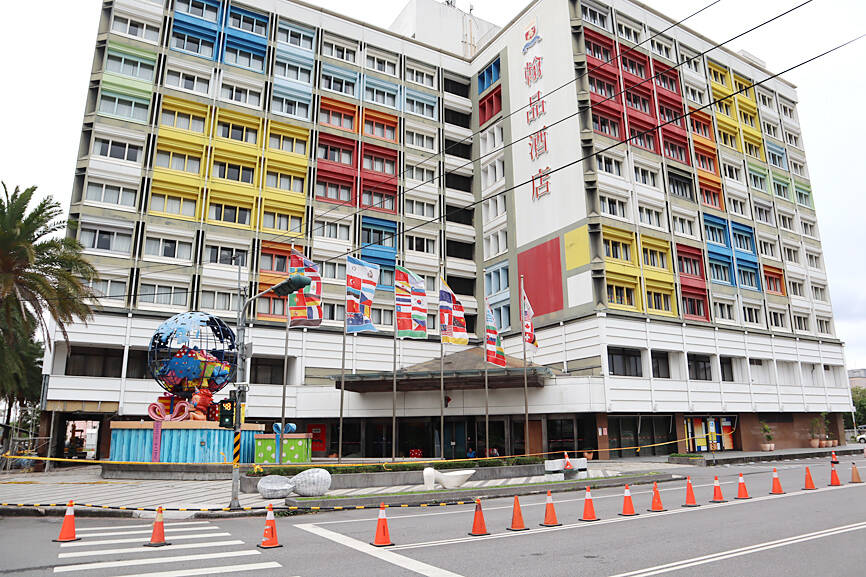The owner of Chateau de Chine Hualien (花蓮翰品酒店) is planning to lay off 86 workers after shutting down the hotel due to damage it sustained in a powerful earthquake on Wednesday last week, the Ministry of Labor said yesterday.
The hotel has submitted a layoff report to the Hualien County Government and expects to let 69 workers go this month and 17 next month, the ministry said.
LDC Hotels & Resorts Group (雲朗觀光集團), the owner of Chateau de Chine Hualien, confirmed the layoff plan in a statement yesterday.

Photo: CNA
LDC said the hotel has been closed since Wednesday last week when the temblor occurred on the coast of Hualien.
The earthquake, the strongest to hit Taiwan in nearly 25 years, measured 7.2 on the Richter scale and magnitude 7.4 on the moment magnitude scale.
The group has followed the Act for Worker Protection of Mass Redundancy (大量解僱勞工保護法) by submitting the layoff plan to local labor authorities, LDC said.
LDC had been planning to rebuild the Chateau de Chine Hualien, which is more than 40 years old, and because of serious damage caused by the earthquake, it immediately shut the hotel down to start the project, local media reported.
The building was reportedly left with cracked, flaking and chipped concrete surfaces after the earthquake and its immediate aftershocks.
LDC said it would talk with the hotel’s affected employees to see if they are willing to transfer to the group’s other businesses, pledging that those who want to leave would have their interests protected under the Labor Standards Act (勞動基準法).
Chateau de Chine Hualien has almost 100 employees, LDC said.
The group operates other hotels in Taiwan, including Palais de Chine Hotel Taipei (君品酒店) and Fleur de Chine Hotel (雲品溫泉酒店) near Sun Moon Lake (日月潭), as well as others under the Chateau de Chine, Maison de Chine (兆品酒店) and Hotel Pin (品文旅) brands. It also runs the banquet facility Gala de Chine (頤品大飯店).

SEMICONDUCTOR SERVICES: A company executive said that Taiwanese firms must think about how to participate in global supply chains and lift their competitiveness Taiwan Semiconductor Manufacturing Co (TSMC, 台積電) yesterday said it expects to launch its first multifunctional service center in Pingtung County in the middle of 2027, in a bid to foster a resilient high-tech facility construction ecosystem. TSMC broached the idea of creating a center two or three years ago when it started building new manufacturing capacity in the US and Japan, the company said. The center, dubbed an “ecosystem park,” would assist local manufacturing facility construction partners to upgrade their capabilities and secure more deals from other global chipmakers such as Intel Corp, Micron Technology Inc and Infineon Technologies AG, TSMC said. It

NO BREAKTHROUGH? More substantial ‘deliverables,’ such as tariff reductions, would likely be saved for a meeting between Trump and Xi later this year, a trade expert said China launched two probes targeting the US semiconductor sector on Saturday ahead of talks between the two nations in Spain this week on trade, national security and the ownership of social media platform TikTok. China’s Ministry of Commerce announced an anti-dumping investigation into certain analog integrated circuits (ICs) imported from the US. The investigation is to target some commodity interface ICs and gate driver ICs, which are commonly made by US companies such as Texas Instruments Inc and ON Semiconductor Corp. The ministry also announced an anti-discrimination probe into US measures against China’s chip sector. US measures such as export curbs and tariffs

The US on Friday penalized two Chinese firms that acquired US chipmaking equipment for China’s top chipmaker, Semiconductor Manufacturing International Corp (SMIC, 中芯國際), including them among 32 entities that were added to the US Department of Commerce’s restricted trade list, a US government posting showed. Twenty-three of the 32 are in China. GMC Semiconductor Technology (Wuxi) Co (吉姆西半導體科技) and Jicun Semiconductor Technology (Shanghai) Co (吉存半導體科技) were placed on the list, formally known as the Entity List, for acquiring equipment for SMIC Northern Integrated Circuit Manufacturing (Beijing) Corp (中芯北方積體電路) and Semiconductor Manufacturing International (Beijing) Corp (中芯北京), the US Federal Register posting said. The

India’s ban of online money-based games could drive addicts to unregulated apps and offshore platforms that pose new financial and social risks, fantasy-sports gaming experts say. Indian Prime Minister Narendra Modi’s government banned real-money online games late last month, citing financial losses and addiction, leading to a shutdown of many apps offering paid fantasy cricket, rummy and poker games. “Many will move to offshore platforms, because of the addictive nature — they will find alternate means to get that dopamine hit,” said Viren Hemrajani, a Mumbai-based fantasy cricket analyst. “It [also] leads to fraud and scams, because everything is now